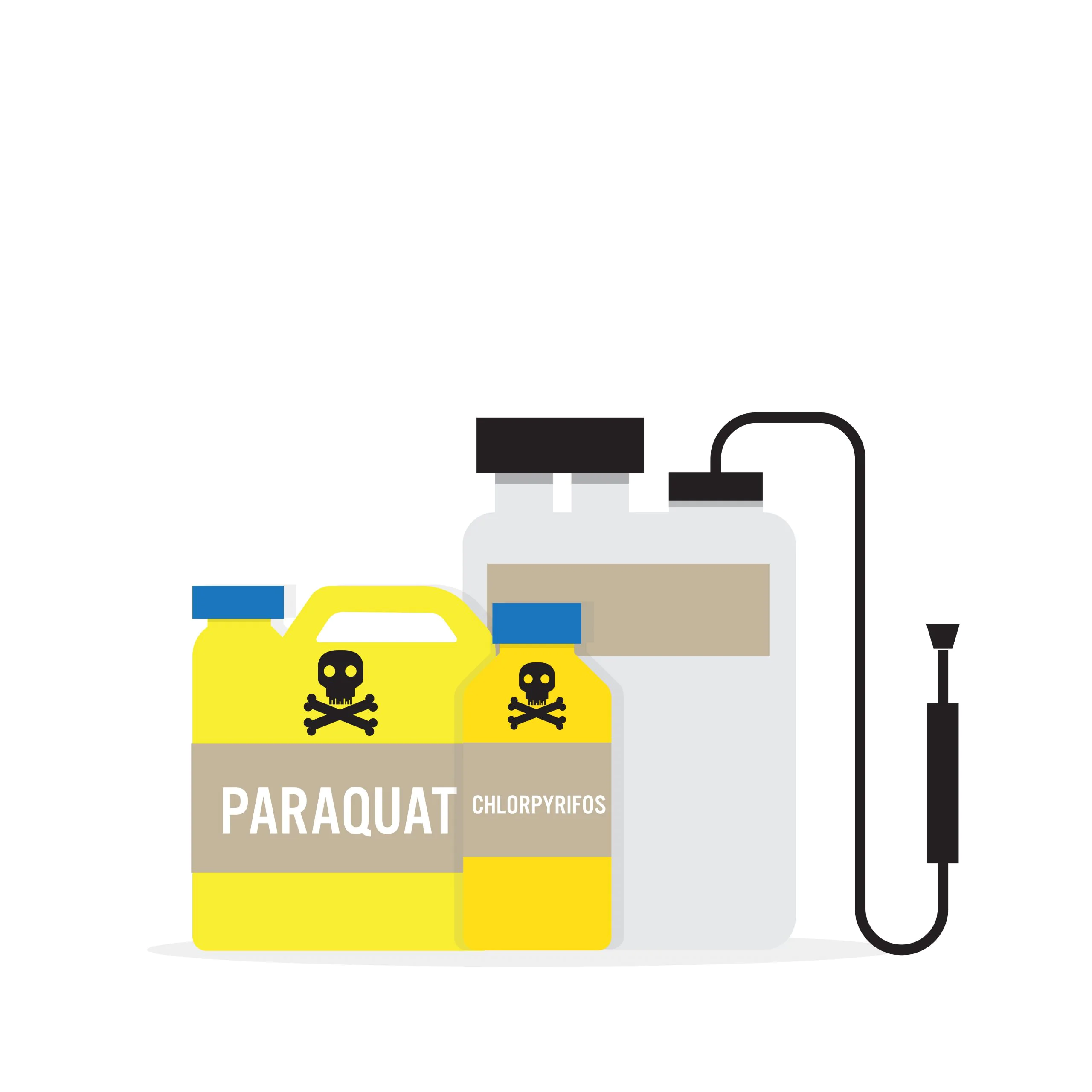Paraquat is one of the world’s most commonly-used herbicides for weed and grass control in farming. Due to its toxicity, paraquat is banned in 32 countries and available for use in the United States only by commercially licensed applicators. The Center for Disease Control and Protection (CDC) recognizes that paraquat is highly poisonous and that the severity of its effects depend on the route, amount, and duration of exposure.
Syngenta, Growmark and Chevron Chemical (the agrochemical giants that manufacture Paraquat) ignored and downplayed known risks despite research over decades linking the chemical to neurological disorders. Farmers who use Paraquat are estimated to be 2.5 times more likely to develop Parkinson’s disease. At this time, the first two Paraquat product defect lawsuits have been filed in federal court. It’s highly advisable for anyone harmed by the use of Paraquat to speak with a personal injury attorney to discuss lawsuit eligibility.
Paraquat’s Effects on the Human Body
Paraquat works to kill plants on contact by producing molecules that damage cells by causing oxidative stress. Other names it is marketed as include:
- Paraquat Concentrate®
- Gramoxone®
- Blanco®
- Cyclone SL 2.0®
- Firestorm®
- Helmquat 3SL®
- Bonedry®
- Devour®
- Para-Shot 3.0®
Paraquat has been called “the most highly acutely toxic herbicide to be marketed over the last 60 years” by research scientists at Brandeis University. It poisons people by causing direct damage when it comes into contact with the lining of the mouth, stomach, or intestines. It is particularly dangerous because of how easily it is absorbed by the body, and the fact that there is no known antidote.
After it enters the body, it is distributed to all bodily systems. After Paraquat enters the body, it is distributed to all areas of the body, primarily the lungs, liver, and kidneys. It can lead to heart, kidney, and liver failure, respiratory failure, scarring of the lungs and esophagus, and seizures, among other severe effects.
What is Parkinson’s Disease?
Parkinson’s is an incurable progressive nervous system disorder that affects the motor system when nerve cells in the brain don’t produce enough dopamine. Some cases are genetic, but most cases don’t seem to be.
Symptoms of Parkinson’s disease tend to surface gradually, often on one side of the body and later affecting both. These early symptoms include:
- Trembling of hands, arms, legs, jaw and face
- Stiffness of arms, legs, and torso
- Slowness of movement
- Impaired balance and coordination
Paraquat Risks Have Been Known for Years
Paraquat was first manufactured in the U.S. An experiment performed during the 80s found that a contaminant found in heroin (called MPTP) destroyed the same neurons that suffer damage in Parkinson’s disease patients. MPTP and Paraquat have very similar chemical structures.
In 1997, the Environmental Protection Agency announced a link between exposure to Paraquat and Parkinson’s. The EPA revealed the mixing, loading, application, and post-application process represented the primary route of exposure to the chemical compound. Further, the agency suggested that despite the herbicide not being registered for residential use, residential exposure can occur for those living near farms where paraquat has been applied. It has since been revealed that any exposure to Paraquat within 1,600 feet resulted in a 75% increased risk of Parkinson’s disease.
Throughout the years, numerous studies have continued to establish the link between the chemical and Parkinson’s. In July 2017, the Unified Parkinson’s Advocacy Council sent a letter to the EPA listing facts that connect the chemical with the disease, urging the EPA to deny Paraquat’s re-registration for use entirely. Later in October 2017, the first lawsuit was filed against Syngenta and Growmark on behalf of farmers and agricultural workers who had developed Parkinson’s after Paraquat exposure.
In 2019, Congress introduced a bill seeking to ban Paraquat use in the United States, where it is still legal as of March 2021.
How Exposure to Paraquat Occurs
Paraquat poisoning can occur through skin exposure, inhalation, or ingestion. The
-
- Ingestion: The most likely route of exposure is ingestion. Without safeguard additives like dye, odor, and vomiting agents, people would not know they were contaminated by the chemical. The use of these additives does not eliminate the risk of unintentional consumption.
- Skin Exposure: Poisoning is more likely to occur if the skin exposure lasts a long time, involves a concentrated version of Paraquat, or occurs through damaged skin (such as sores or cuts). Anyone in contact with an exposed agricultural worker’s clothing, vehicle materials, and furniture that he or she touched can suffer severe side effects as well.
- Inhalation: Paraquat inhalation can result in serious, permanent lung damage. The risk of exposure through inhalation reaches everyone who lives or works within 1,600 feet of Paraquat use.
Symptoms of Paraquat Exposure
There are many symptoms that may display after an exposure to Paraquat. After skin contact with the contaminant, one might notice chemical burns, rashes, or extreme redness. If skin exposure is suspected, any contaminated clothing should be immediately removed. Skin should be washed with soap and water, and medical attention should be sought immediately.
If someone swallows a significant amount of Paraquat, he or she will experience swelling and pain in the mouth and throat immediately. Gastrointestinal symptoms may also occur quickly: nausea, diarrhea, vomiting, and abdominal pain. Within a few hours to a few days, he or she will likely experience kidney failure, heart problems, muscle weakness, confusion, liver failure, seizures, coma, and/or death.
Filing a Paraquat Lawsuit After Exposure
Victims who were injured and the survivors of people who died due to Paraquat poisoning are eligible to file an injury lawsuit against the manufacturer of the chemical. Additionally, claims could potentially be made against distributors or the people who applied the herbicide.
There are currently a wide variety of victims across the United States being represented in Paraquat exposure claims. This includes farm and agricultural workers, manufacturing employees, and exposed family members
Victims or next of kin may be eligible to recover compensation for losses caused by the exposure. These damages may potentially include:
- Any related medical bills and future medical expenses
- Lost wages and lost earning capacity
- Compensation for future lost wages in the event of permanent disability
- Pain and suffering
Pressing the claim for Paraquat exposure may be helpful in managing the mounting costs of surgery, pain medication, any on-going treatment, or an untimely death. It can also encourage herbicide manufacturers to appropriately test their products before marketing and selling them.
The Economic Costs to Suffering from Parkinson’s Disease
The following is an excerpt from a letter sent from Unified Parkinson’s Advocacy Council to the EPA: “…the economic and emotional costs of living with Parkinson’s are too high to continue allowing the use of an herbicide so strongly linked to the disease.” It’s emphasized that a person with the disease spends an estimated $26,400 per year on individual care. However, the cost of doctor consultations, medications, hospitalizations and therapies can easily reach tens of thousands of dollars more per year.
In addition to medical expenses, patients and their families can have costs such as family caregiver time or early forced retirement. Those who cannot work due to Parkinson’s can lose employer-sponsored healthcare benefits and face challenges qualifying for private coverage because of their Parkinson’s.
Find Out if You Are Eligible for a Paraquat Lawsuit at Sobo & Sobo
Syngenta did not warn that being exposed to herbicide could cause you to develop Parkinson’s disease. The Law Offices of Sobo & Sobo want to help hold manufacturers accountable while making sure you receive the best care possible.
If you or a loved one were exposed to paraquat and developed Parkinson’s disease, call 845-468-7626 or contact online for a free consultation with an expert defective device lawyer.




